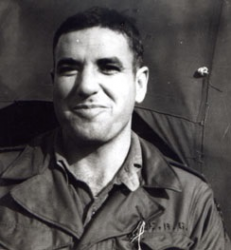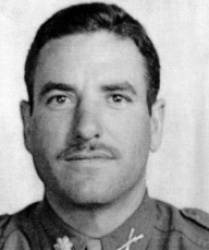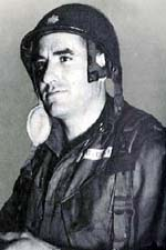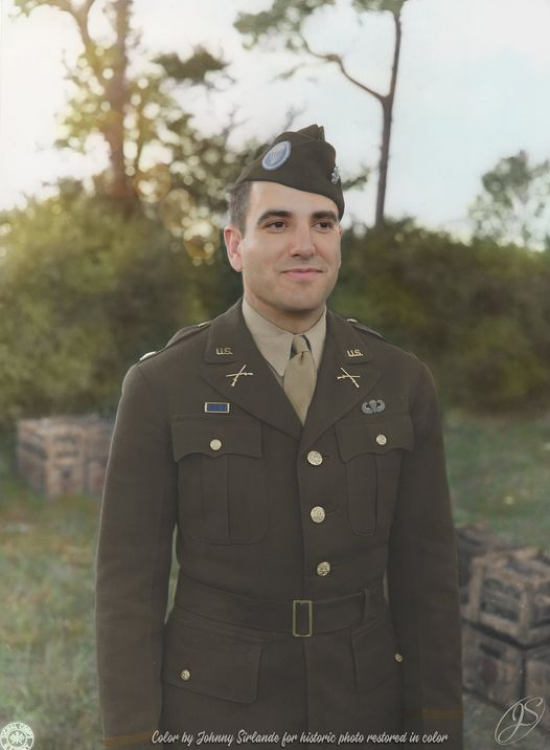
 |
|
|
||
|
Robert George Cole |
||||
|
Graduate, U.S. Military Academy, Class of 1939 Engagements: • World War II (1941 - 1945) |
||||
| Biography: | ||||
|
Robert George Cole Lieutenant Colonel Robert George Cole was a U.S. Army officer who was posthumously awarded the Medal of Honor for his heroic actions during World War II. Robert George Cole was born on 19 March 1915 at Fort Sam Houston in San Antonio, TX, to Colonel Clarence F. Cole, an Army doctor, and Clara H. Cole. He graduated from Thomas Jefferson High School in San Antonio in 1933 and joined the U.S. Army on 1 July 1934. On 26 June 1935, he was honorably discharged to accept an appointment to the U.S. Military Academy at West Point. Cole graduated with the USMA Class of 1939 and was commissioned as a Second Lieutenant of Infantry. He then returned home to marry Allie Mae Wilson. His first duty assignment was with the 15th Infantry at Fort Lewis, WA, in 1939. He remained there until his transfer to the 501st Parachute Infantry Battalion at Fort Benning, GA, in 1941. In March 1941, he earned his jump wings. Cole was rapidly advanced through the ranks at Fort Benning as the parachute infantry battalions were expanded to regiments. As a result, on D-Day, 6 June 1944, he was a Lieutenant Colonel commanding the 3rd Battalion of the 502nd Parachute Infantry Regiment (PIR) of the 101st Airborne Division during his unit's first combat jump. D-Day Operations LTC Cole parachuted into Normandy with his unit as part of the massive American airborne landings in Normandy. Although many aircraft missed their drop zones and the troopers were widely scattered, by the evening of 6 June, he had gathered 75 men. They captured Exit 3 at Saint Martin-de-Varreville behind Utah Beach and were at the dune line to welcome men from the U.S. 4th Infantry Division as they came ashore. After being in division reserve, Cole's battalion had guarded the right flank of the 101st Airborne's attempts to take the approaches to Carentan. On the afternoon of 10 June, Cole led 400 men of his battalion single-file down a long, exposed causeway (Purple Heart Lane), with marshes at either side. A hedgerow behind a large farmhouse on the right was occupied by well dug-in German troops. At the far end of the causeway was the last of four bridges over the Douve River flood plain. Beyond the last bridge was Carentan, which the 101st had been ordered to seize in order to allow a linkup with the 29th Infantry Division coming off of Omaha Beach. During the advance, Cole's 3rd Battalion was subjected to continuous fire from artillery, machine guns and mortars. His battalion, advancing slowly by crawling or crouching, took numerous casualties. The survivors huddled against the bank on the far side of the causeway. An obstacle known as a Belgian Gate blocked nearly the entire roadway over the last bridge, allowing the passage of only one man at a time. Attempts to force this bottleneck were futile, and the battalion took up defensive positions for the night. During the night, Cole's men were exposed to shelling by German mortars and by a strafing and bombing attack by two aircraft, causing further casualties and knocking Item Company out of the fight. However the fire from the farm slackened and the remaining 265 men of 3,502 infiltrated through the obstacle and took up positions for an assault. With the Germans still resisting any attempt to move beyond the bridges, and after artillery failed to suppress their fire, Cole called for smoke on the dug-in Germans and ordered a bayonet charge, a rarity in World War II. He charged toward the hedgerow, leading only a small portion of his unit at first. The remainder of the battalion, seeing what was happening followed as Cole led the paratroopers into the hedgerows, engaging at close range and with bayonets in hand-to-hand combat. The German survivors retreated, taking more casualties as they ran away. The bayonet assault on 11 June, which came to be known as "Cole's Charge," proved costly; 130 of Cole's 265 men became casualties. With his battalion exhausted, Cole called for the 1st Battalion to pass through his lines and continue the attack. However, they were also severely depleted by mortar fire while crossing bridge #4, to such an extent that that they took up positions with 3rd Battalion rather than proceeding. There, on the edge of Carentan, they were subjected to strong counterattacks by the German 6th Parachute Regiment during the morning and afternoon. At the height of the attack, at approximately 1900, Cole's artillery observer managed to break through radio jamming and called down a concentration of fire by the entire Corps artillery that broke up the attacks for good. At 0200 on 12 June, the 506th PIR passed through their line and captured Hill 30 to the south of Carentan. From there, led by Company E, the 2nd of the 506th PIR (from Band of Brothers fame) attacked north into Carentan at daylight as part of a 3-battalion assault. The German 6th Parachute Regiment, virtually out of ammunition, had abandoned the town during the night, leaving only a small rear guard. By 0730 of 12 June, Carentan was captured. LTC Cole was recommended for a Medal of Honor for his actions on 11 June, but never lived to receive it. On 18 September 1944 during Operation Market Garden, LTC Cole, commanding the 3rd Battalion of the 502d PIR in Best, Netherlands, got on the radio. A pilot asked him to put some orange identification panels in front of his position and, typical of Cole, he decided to help his men do it. While he was placing a panel on the ground, he was shot in the head by a German sniper and killed instantly. One of the German weapons that fired persistently into 3/502 positions on the [September] 18th [1944] was a 20mm gun situated quite a distance to the north. PFC Chester Elliott of I/502 left his machine gun long enough to borrow a trooper’s [Springfield] .03 rifle from the adjacent foxhole. Running the sights up to seven hundred yards, Elliott was able to drop one of the 20mm gunners, whose body draped over the top of the weapon. After hitting a second crewman, the gun stopped firing for the rest of that day. Medal of Honor Rank and organization: Lieutenant Colonel, U.S. Army, 101st Airborne Division. Place and date: Near Carentan, France, 11 June 1944. Citation: For gallantry and intrepidity at the risk of his own life, above and beyond the call of duty on 11 June 1944, in France. Lt. Col. Cole was personally leading his battalion in forcing the last 4 bridges on the road to Carentan when his entire unit was suddenly pinned to the ground by intense and withering enemy rifle, machinegun, mortar, and artillery fire placed upon them from well-prepared and heavily fortified positions within 150 yards of the foremost elements. After the devastating and unceasing enemy fire had for over 1 hour prevented any move and inflicted numerous casualties, Lt. Col. Cole, observing this almost hopeless situation, courageously issued orders to assault the enemy positions with fixed bayonets. With utter disregard for his own safety and completely ignoring the enemy fire, he rose to his feet in front of his battalion and with drawn pistol shouted to his men to follow him in the assault. Catching up a fallen man's rifle and bayonet, he charged on and led the remnants of his battalion across the bullet-swept open ground and into the enemy position. His heroic and valiant action in so inspiring his men resulted in the complete establishment of our bridgehead across the Douve River. The cool fearlessness, personal bravery, and outstanding leadership displayed by Lt. Col. Cole reflect great credit upon himself and are worthy of the highest praise in the military service. War Department, General Orders No. 79, October 4, 1944 Two weeks later, on the parade ground at Fort Sam Houston where Cole had played as a child, the Medal of Honor for Lieutenant Colonel Cole's heroic bayonet charge was presented to his mother, Clara Cole, while his widow, Allie, and his two-year-old son looked on. Honors Robert G. Cole High School at Fort Sam Houston is named after Robert G. Cole. A housing area, Cole Park, at Fort Campbell, KY, is named in his honor. LTC Cole is one of the true-to-life characters in the 2005 Gearbox Software games Brothers In Arms: Road to Hill 30, Brothers In Arms: Earned in Blood and the 2008 game Brothers In Arms: Hell's Highway. On 18 September 2009, a monument was unveiled at Best in The Netherlands, near the place of his death. Cole's son was present at the ceremony, as were members and veterans of the 101st Airborne Division. Death and Burial Lieutenant Colonel Robert George Cole was killed in action on 18 September 1944. He is buried at Netherlands American Cemetery and Memorial in Margraten, Margraten Municipality, Limburg, Netherlands, in Plot B, Row 15, Grave 27. A Candid, Behind-the-Scenes Look into the Military Life of LTC Robert G. Cole The information contained here is courtesy of Mark Bando, noted author and World War II historian of the 101st Airborne Division. The material is excerpted from two of his interesting, factual, and well-documented books: 101st Airborne, The Screaming Eagles in World War II and Avenging Eagles, Forbidden Tales of the 101st Airborne in World War 2 This glimpse into actual events and actions by the tough-as-nails Cole includes a unique friendship, based on mutual respect, he developed with an enlisted man. For a battalion commander to be friends with a private first class in one of his company's is, at the very least, highly unusual. LTC Robert G. Cole, the commander of "3/502" 3rd Battalion, 502nd Parachute Infantry Regiment (PIR), 101st Airborne Division, was lean, muscular, and tall, with a booming voice, which he seldom bothered to lower. He wore his overseas cap cocked on the back of his head, and he ruled the men of his battalion with an iron hand. Somehow, he managed to control his wild bunch of troopers by sheer intimidation. As Ralph Kelly puts it, "I was more afraid of Cole than I ever was of the Germans." During advanced training at Ft. Bragg [North Carolina], LTC Cole became well-acquainted with a PFC named Chester Elliott [Honoree Record ID 215000] in Item Co. Chester had been a dirt poor farmer in southeastern Missouri, and he was obviously a strong and competent soldier. The men in Chester's company all called him 'Bob' because he looked like the twin of a 1940s radio comedian known as Bob Burns. When LTC Cole encountered Chester in formation or on a training problem, it was one of the rare times he would lower his voice and talk as an equal with an enlisted man. He even allowed Chester to address him by his first name, which was also Bob. Chester was the only EM [enlisted man] in 3/502 allowed to call LTC Cole 'Bob.' "How you makin' it Bob?" Cole would ask. "I'm OK, sir," Chester would reply with a nod and a casual smile. Then Chester would say, "Bob, I want to ask you something…" "What is it, Bob?" Cole would say. This was a rare circumstance that the other EM of the battalion could only marvel at. One afternoon during maneuvers, live ammunition was being fired over the heads of paratroopers who were in motion, simulating an attack. LTC Cole was walking in the area, and he encountered Chester Elliott, holding a belt-fed light machine-gun at the hip and firing live rounds over the heads of his advancing buddies from behind. "Bob! You know that weapon is supposed to be mounted on a tripod for live fire exercises!" Cole shouted. "Don't you realize you could be court-martialed for this?" Chester nodded and held his fire, then began searching for a tripod to mount the weapon on. Cole walked on down the line, then he heard Chester's weapon resume firing. He glanced back and saw that Chester was again firing from the hip. Cole could see the tracers arcing over the heads of the advancing troopers. Fighting back a smile, Cole caught Chester's eye. Chester smiled and kept on firing. Cole shook his fist at Chester in mock anger, but then turned and kept walking away. Cole had so much faith in Chester's abilities with the LMG [light machine gun] that he permitted this breach of procedure, virtually placing the lives of many other troopers in Chester's hands, confident that Chester was too competent to shoot any of them accidentally. Cole knew that Chester had grown up in the Missouri wilderness with a rifle in his hands. He had seen him field-strip and reassemble the LMG blindfolded, in seven minutes. Ultimately, he knew that the 502 would soon be in combat and that Chester would routinely use live ammo to protect the lives of his buddies. Here is one example of the kind of individual soldier and leader that would make the 101st Airborne such an efficient fighting team. Rank was a significant issue among enlisted riflemen. Many men like Chester, who proved to be tops in combat, had no interest in rising above Private First Class (PFC), which they claimed was "the best rank in the Army." A single chevron on the arm showed that a rifleman was good at his profession, but it also entailed none of the responsibilities that went with NCO ranks (corporals and sergeants), that would affect others. When LTC Cole threatened to promote Chester Elliott to sergeant, Chester responded with a threat of his own: "Bob, if you make me a sergeant, I'll go over the hill [AWOL, absent without leave]." Later on D-Day, a brief shootout took place at a French farm. When white rags were waved to signal surrender, a red-headed German officer came out of the farmhouse, followed by his pregnant French girlfriend and her family. This German displayed a very arrogant and condescending attitude toward the Americans, which angered a red-headed American lieutenant from Alabama, nicknamed 'Simon.' Simon shot the German on the spot, killing him in front of his French 'relatives.' The shooting caused the family to start screaming and 'raising hell,' which made Chester want to shoot the bunch of them. The Americans finally moved on without further incident. Chester encountered LTC Cole, who asked, "How you makin' it, Bob?" Chester was already getting a reputation for taking few, if any, prisoners. As Earl Kelly stated it, "Chester shot everybody…" Chester told Colonel Cole, "Now Bob, don't be getting' on me about the way I'm fighting the war, cause I'm fighting it to suit myself… and I ain't takin' no dang prisoners…" Cole replied, "I know, Bob, I'm not taking any either…" This was probably said to let Chester know that Cole had no intention of interfering with his methods. Cole himself took so many reckless chances under fire in Normandy that his troops marveled over his lack of concern for enemy bullets. Earl Kelly said, "If you watched how Cole behaved under fire in Normandy, you'd either have to conclude that he was incredibly stupid, or that he had a death wish." |
||||
| Honoree ID: 1338 | Created by: MHOH | |||
Ribbons
Medals
Badges
Honoree Photos
 |  |  |
 |  |
 |


